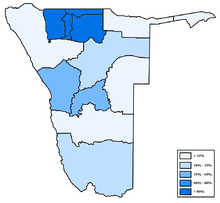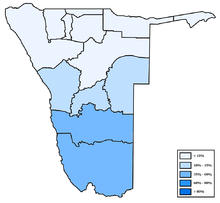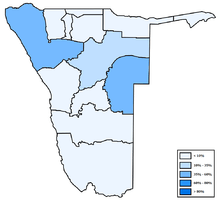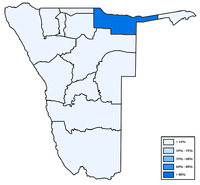Demographics of Namibia
This article is about the demographic features of the population of Namibia, including population density, ethnicity, education level, health of the populace, economic status, religious affiliations and other aspects of the population.
Namibians are of diverse ethnic origins. The principal groups are the Ovambo, Kavango, Herero/Himba, Damara, mixed race (Coloured and Rehoboth Baster), White Namibians (Afrikaner, German, British and Portuguese), Nama, Caprivian (Lozi), San, and Tswana. The Coloureds and Basters share similar genealogical origins and cultural attributes (such as home language) but nonetheless maintain distinctly separate communal identities, as do most white Namibians and black Namibians, respectively.
The Ovambo make up about half of Namibia's people. The Ovambo, Kavango, and East Caprivian peoples, who occupy the relatively well-watered and wooded northern part of the country, are settled farmers and herders. Historically, they have shown little interest in the central and southern parts of Namibia, where conditions do not suit their traditional way of life.
Until the early 20th century, these tribes had little contact with the Nama, Damara, and Herero, who settled around the central part of the country vying for control of sparse pastureland. German colonial rule destroyed the warmaking ability of the tribes but did not erase their identities or traditional organization. People from the more populous north have settled throughout the country in recent decades as a result of urbanization, industrialization, and the demand for labor.
The modern mining, farming, and industrial sectors of the economy, controlled by the white minority, have affected traditional African society without transforming it. Urban and migratory workers have adopted Western ways, but in rural areas, traditional society remains intact.
Missionary work during the 19th century drew many Namibians to Christianity, especially Lutheranism. While most Namibian Christians are Lutheran, there also are Roman Catholic, Methodist, Anglican, African Methodist Episcopal, and Dutch Reformed Christians represented.
Modern education and medical care have been extended in varying degrees to most rural areas in recent years. The literacy rate of Africans is generally low except in sections where missionary and government education efforts have been concentrated, such as Ovamboland. The Africans speak various indigenous languages.
The minority white population is primarily of South African, British, and German descent, with a few Portuguese. About 60% of the whites speak Afrikaans (a language derived from the 17th century Dutch), 32% speak German, and 7% speak English.
Population

.jpg)
Census results
| Historical populations in thousands | ||
|---|---|---|
| Year | Pop. | ±% p.a. |
| 1921 | 228,910 | — |
| 1936 | 320,450 | +2.27% |
| 1946 | 362,460 | +1.24% |
| 1951 | 439,000 | +3.91% |
| 1970 | 761,000 | +2.94% |
| 1981 | 1,033,000 | +2.82% |
| 1991 | 1,490,000 | +3.73% |
| 2001 | 1,830,000 | +2.08% |
| 2011 | 2,104,000 | +1.41% |
As required by the Namibian Statistics Act #66 of 1976, and in accordance with United Nations recommendations, a census is conducted every ten years. After Namibian independence the first Population and Housing Census was carried out in 1991, further rounds followed in 2001 and 2011.[1] The data collection method is to count every person resident in Namibia on the census' reference night, wherever they happen to be. This is called the de facto method.[2] For enumeration purposes the country is demarcated into 4,042 enumeration areas. These areas do not overlap with constituency boundaries in order to get reliable data for election purposes as well.[3]
The 2011 Population and Housing Census counted 2,113,077 inhabitants of Namibia. Between 2001 and 2011 the annual population growth was 1.4%, down from 2.6% in the previous ten–year period.[4]
In 2011 the total fertility rate was 3.6 children per woman, down from 4.1 in 2001.
UN estimates
According to the 2010 revision of the World Population Prospects the total population was 2 283 000 in 2010, compared to only 485 000 in 1950. The proportion of children below the age of 15 in 2010 was 36.4%, 59.9% was between 15 and 65 years of age, while 3.7% was 65 years or older .[5]
| Total population (x 1000) | Population aged 0–14 (%) | Population aged 15–64 (%) | Population aged 65+ (%) | |
|---|---|---|---|---|
| 1950 | 485 | 38.8 | 57.1 | 4.1 |
| 1955 | 538 | 40.5 | 55.6 | 4.0 |
| 1960 | 603 | 41.6 | 54.7 | 3.7 |
| 1965 | 683 | 42.5 | 53.9 | 3.6 |
| 1970 | 780 | 43.1 | 53.3 | 3.6 |
| 1975 | 906 | 44.3 | 52.2 | 3.5 |
| 1980 | 1 013 | 46.6 | 49.9 | 3.5 |
| 1985 | 1 150 | 47.0 | 49.5 | 3.5 |
| 1990 | 1 415 | 43.7 | 53 | 3.4 |
| 1995 | 1 651 | 42 | 54.6 | 3.4 |
| 2000 | 1 896 | 40.3 | 56.3 | 3.4 |
| 2005 | 2 080 | 38.9 | 57.6 | 3.4 |
| 2010 | 2 283 | 36.4 | 59.9 | 3.7 |
Vital statistics
Registration of vital events is in Namibië not complete. The Population Departement of the United Nations prepared the following estimates. [5]
| Period | Live births per year | Deaths per year | Natural change per year | CBR* | CDR* | NC* | TFR* | IMR* |
|---|---|---|---|---|---|---|---|---|
| 1950-1955 | 22 000 | 12 000 | 10 000 | 43.4 | 22.9 | 20.4 | 6.00 | 172 |
| 1955-1960 | 24 000 | 11 000 | 13 000 | 42.7 | 19.9 | 22.8 | 6.10 | 149 |
| 1960-1965 | 27 000 | 11 000 | 16 000 | 42.3 | 17.4 | 24.9 | 6.20 | 130 |
| 1965-1970 | 31 000 | 11 000 | 20 000 | 42.4 | 15.4 | 27.0 | 6.30 | 115 |
| 1970-1975 | 37 000 | 12 000 | 26 000 | 44.2 | 13.8 | 30.4 | 6.60 | 101 |
| 1975-1980 | 42 000 | 12 000 | 30 000 | 43.8 | 12.1 | 31.6 | 6.60 | 88 |
| 1980-1985 | 45 000 | 11 000 | 33 000 | 41.2 | 10.4 | 30.8 | 6.20 | 75 |
| 1985-1990 | 50 000 | 12 000 | 38 000 | 39.1 | 9.5 | 29.6 | 5.55 | 69 |
| 1990-1995 | 56 000 | 14 000 | 43 000 | 36.7 | 8.9 | 27.8 | 4.91 | 62 |
| 1995-2000 | 58 000 | 17 000 | 42 000 | 32.9 | 9.3 | 23.6 | 4.29 | 55 |
| 2000-2005 | 59 000 | 21 000 | 38 000 | 29.9 | 10.6 | 19.3 | 3.81 | 48 |
| 2005-2010 | 60 000 | 19 000 | 41 000 | 27.4 | 8.6 | 18.8 | 3.40 | 38 |
| * CBR = crude birth rate (per 1000); CDR = crude death rate (per 1000); NC = natural change (per 1000); IMR = infant mortality rate per 1000 births; TFR = total fertility rate (number of children per woman) | ||||||||
Fertility and Births
Total Fertility Rate (TFR) (Wanted Fertility Rate) and Crude Birth Rate (CBR):[6]
| Year | CBR (Total) | TFR (Total) | CBR (Urban) | TFR (Urban) | CBR (Rural) | TFR (Rural) |
|---|---|---|---|---|---|---|
| 1992 | 42 | 5,4 (4,8) | 43 | 4,0 (3,4) | 42 | 6,3 (5,8) |
| 2000 | 30,5 | 4,2 (3,4) | 29,9 | 3,1 (2,4) | 30,8 | 5,1 (4,2) |
| 2006-2007 | 29,2 | 3,6 (2,7) | 28,8 | 2,8 (2,2) | 29,6 | 4,3 (3,3) |
| 2013 | 29,5 | 3,6 (2,9) | 30,0 | 2,9 (2,4) | 29,3 | 4,7 (3,5) |
Ethnic groups[7]
Languages[7]
Oshiwambo languages 48.9%
- Nama/Damara 11.3%
- Afrikaans 10.4%
- Otjiherero 8.6%
- Kavango 8.5%
- Caprivi 4.8%
- English (official) 3.4%
- Other African languages 2.3%
- Other 1.7%

_in_Namibia.png)




Religion[7]
- Christian 80% to 90% (at least 50% Lutheran)
- Indigenous beliefs 10% to 20%
CIA World Factbook demographic statistics
The following demographic statistics are from the CIA World Factbook,[8] unless otherwise indicated.
Sex ratio
at birth:
1.03 male(s)/female (2003, 2000 est.)
under 15 years:
1.03 male(s)/female (2003, 2000 est.)
15–64 years:
0.99 male(s)/female (2003, 2000 est.)
65 years and over:
0.78 male(s)/female (2003 est.), 0.76 male(s)/female (2000 est.)
total population:
1 male(s)/female (2003 est.), 0.99 male(s)/female (2000 est.)
Life expectancy at birth
- total population: 52.19 years
- male: 52.48 years
- female: 51.89 years (2011 est.)
HIV/AIDS
adult prevalence rate: 13.1% (2009 est.)
people living with HIV/AIDS: 180,000 (2009 est.)
deaths: 6,700 (2009 est.)
Nationality
noun:
Namibian(s)
adjective:
Namibian
Literacy
definition:
age 15 and over can read and write
total population:
84% (2003 est.) 38% (1960 est.)
male:
84.4% (2003 est.), 45% (1960 est.)
female:
83.7% (2003 est.) 31% (1960 est.)
References
- ↑ "Census Summary Results". National Planning Commission of Namibia. Retrieved 21 February 2012.
- ↑ Kapitako, Alvine (8 August 2011). "Namibia: 2011 Census Officially Launched". New Era. via allafrica.com.
- ↑ "Methodology". National Planning Commission of Namibia. Retrieved 21 February 2012.
- ↑ Duddy, Jo Maré (28 March 2013). "Census gives snapshot of Namibia's population". The Namibian.
- 1 2 Population Division of the Department of Economic and Social Affairs of the United Nations Secretariat, World Population Prospects: The 2010 Revision
- ↑ http://microdata.worldbank.org/index.php/catalog/dhs#_r=&collection=&country=&dtype=&from=1890&page=11&ps=&sk=&sort_by=nation&sort_order=&to=2014&topic=&view=s&vk=
- 1 2 3 "Africa :: NAMIBIA". CIA The World Factbook.
- ↑ Central Intelligence Agency (2009). "Namibia". The World Factbook. Retrieved January 23, 2010.
External links
| Wikimedia Commons has media related to Demographics of Namibia. |